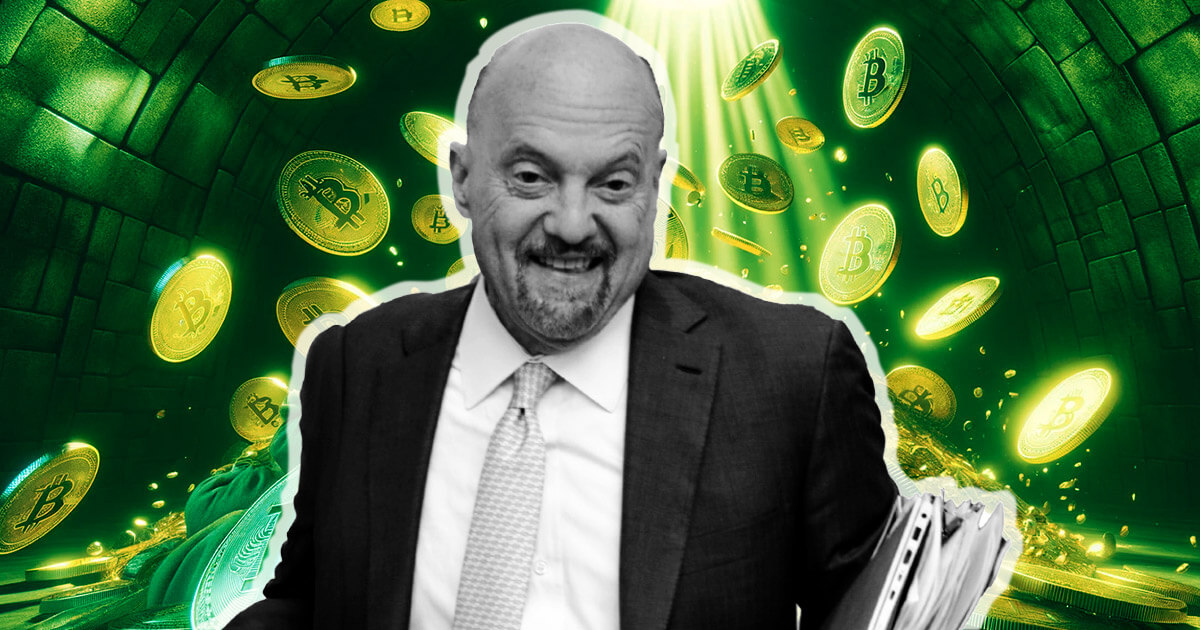
Jim Cramer, the outspoken host of CNBC’s “Mad Cash,” lately sparked discussions within the monetary neighborhood along with his newest views on Bitcoin, signaling a “main prime” within the cryptocurrency’s worth.
His tweet, discussing insights from dealer Larry Williams, departed from his earlier bullish feedback on Bitcoin. Nonetheless, the Mad Cash host didn’t reveal the main points of stated dialog.
Cramer’s tweet additionally drew consideration to a CNBC article that mentioned the variations between Bitcoin ETFs and conventional inventory funds, notably mentioning the absence of sure protections for Bitcoin ETFs underneath the Funding Firm Act of 1940.
The commentary provides to the continuing debate concerning the security and nature of crypto investments in comparison with conventional monetary devices.
Oscillating views
The monetary commentator’s latest bearish activate Bitcoin marks a stark distinction from his earlier bullish stance, the place he lauded the cryptocurrency as a “technological marvel” and acknowledged its resilience and excessive value.
Only a week prior, Cramer had praised Bitcoin’s sturdy market efficiency, solely to shift his viewpoint considerably inside days.
The Mad Cash host has modified his opinion about Bitcoin thrice up to now three weeks, along with his bullish sentiment lasting nearly every week from Jan. 2 to Jan. 9. The newest assertion is extra on par for Cramer, who has lengthy been a critic of Bitcoin and cryptocurrencies.
This oscillation in Cramer’s opinions has been a focal point and debate amongst buyers and market analysts. Whereas his views are extremely influential in mainstream monetary media, the influence of his recommendation on Bitcoin’s precise market dynamics seems to be minimal.
‘Reverse Cramer’ Impact
Intriguingly, Cramer’s commentary on Bitcoin and different monetary issues has led to what some within the crypto neighborhood name the “reverse Cramer” impact.
This time period describes a phenomenon the place some merchants and buyers typically take his market predictions as counter-indicators. As an example, when Cramer expresses a bullish sentiment, it would lead some to anticipate a downturn and vice versa.
Some have even gone so far as to create an “Inverse Cramer ETF” that bets towards his evaluation often. The ETF is at the moment down roughly 11% since its inception in March 2023.
This impact highlights the complicated and generally contradictory relationship between public commentary and market actions, particularly within the extremely unstable crypto sector. It means that whereas public figures can affect market perceptions, the precise market actions may go towards these predictions because of numerous underlying components and investor psychology.
As market watchers and buyers digest Cramer’s newest views, there may be heightened curiosity in understanding how his opinions may affect broader market developments within the crypto area.
Given the sector’s identified volatility and sensitivity to numerous components, together with regulatory modifications and international financial circumstances, the actual influence of such predictions stays a topic of hypothesis and debate.
